The Effects of Ethics and Culture in a Learning Organization: ANZ Bank
VerifiedAdded on 2022/08/23
|11
|2643
|14
Report
AI Summary
This report delves into the ethical landscape of ANZ Bank, a multinational banking and financial services company, examining its organizational learning processes in light of recent scandals. The analysis applies organizational learning theories, including assimilation, adaptive and generative learning, and Senge's five disciplines, to evaluate the bank's responses to ethical breaches such as interest rate manipulation and racist remarks. The report identifies barriers to organizational learning, such as employee resistance to change and lack of leadership training, and recommends strategies for fostering an ethical learning environment, including improved leadership, motivation, and training programs. The conclusion emphasizes the interconnectedness of learning disciplines and the importance of creating opportunities for individual growth within the organization to achieve a competitive edge, while acknowledging limitations such as traditional hierarchical structures.
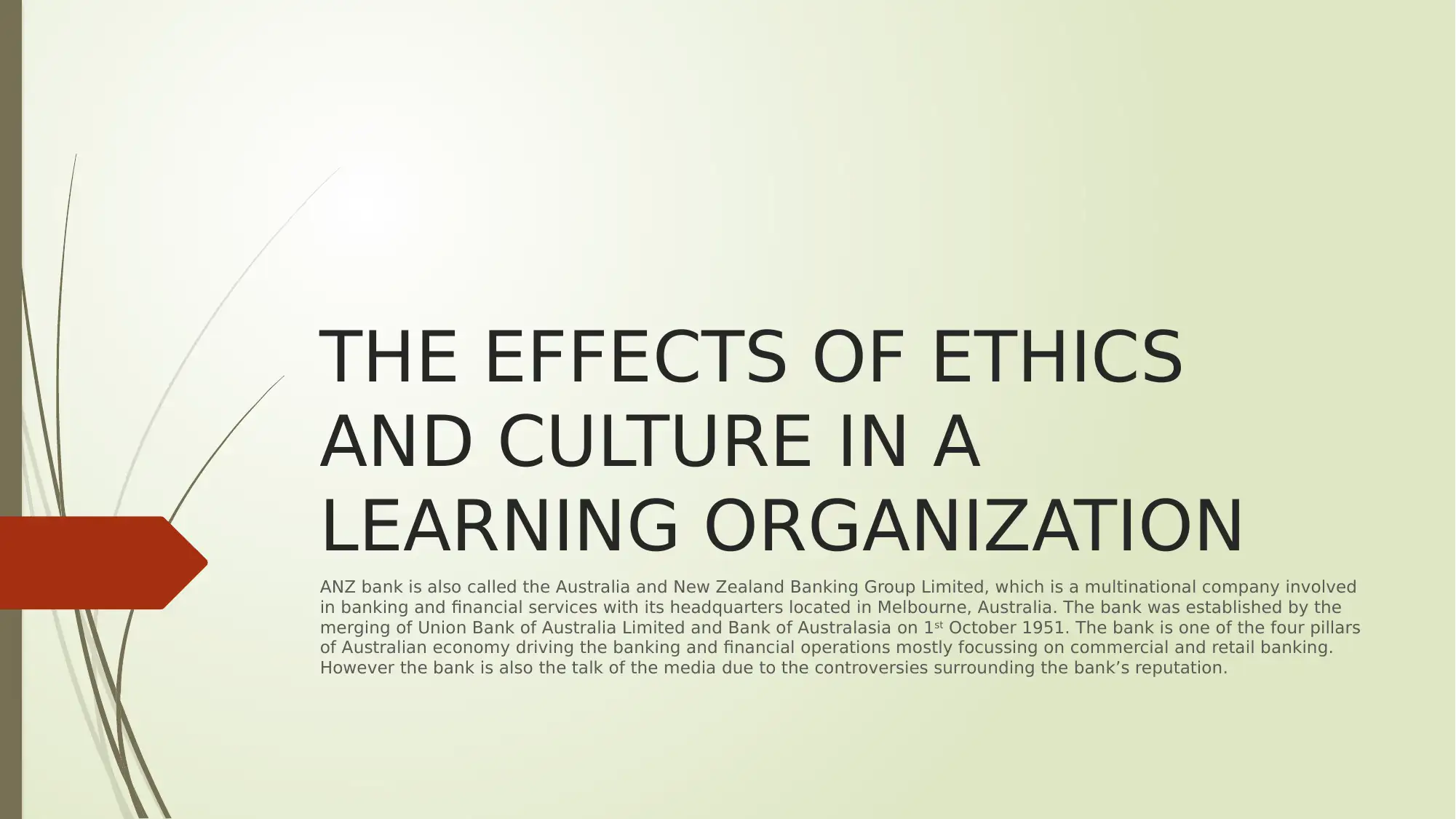
THE EFFECTS OF ETHICS
AND CULTURE IN A
LEARNING ORGANIZATION
ANZ bank is also called the Australia and New Zealand Banking Group Limited, which is a multinational company involved
in banking and financial services with its headquarters located in Melbourne, Australia. The bank was established by the
merging of Union Bank of Australia Limited and Bank of Australasia on 1st October 1951. The bank is one of the four pillars
of Australian economy driving the banking and financial operations mostly focussing on commercial and retail banking.
However the bank is also the talk of the media due to the controversies surrounding the bank’s reputation.
AND CULTURE IN A
LEARNING ORGANIZATION
ANZ bank is also called the Australia and New Zealand Banking Group Limited, which is a multinational company involved
in banking and financial services with its headquarters located in Melbourne, Australia. The bank was established by the
merging of Union Bank of Australia Limited and Bank of Australasia on 1st October 1951. The bank is one of the four pillars
of Australian economy driving the banking and financial operations mostly focussing on commercial and retail banking.
However the bank is also the talk of the media due to the controversies surrounding the bank’s reputation.
Paraphrase This Document
Need a fresh take? Get an instant paraphrase of this document with our AI Paraphraser
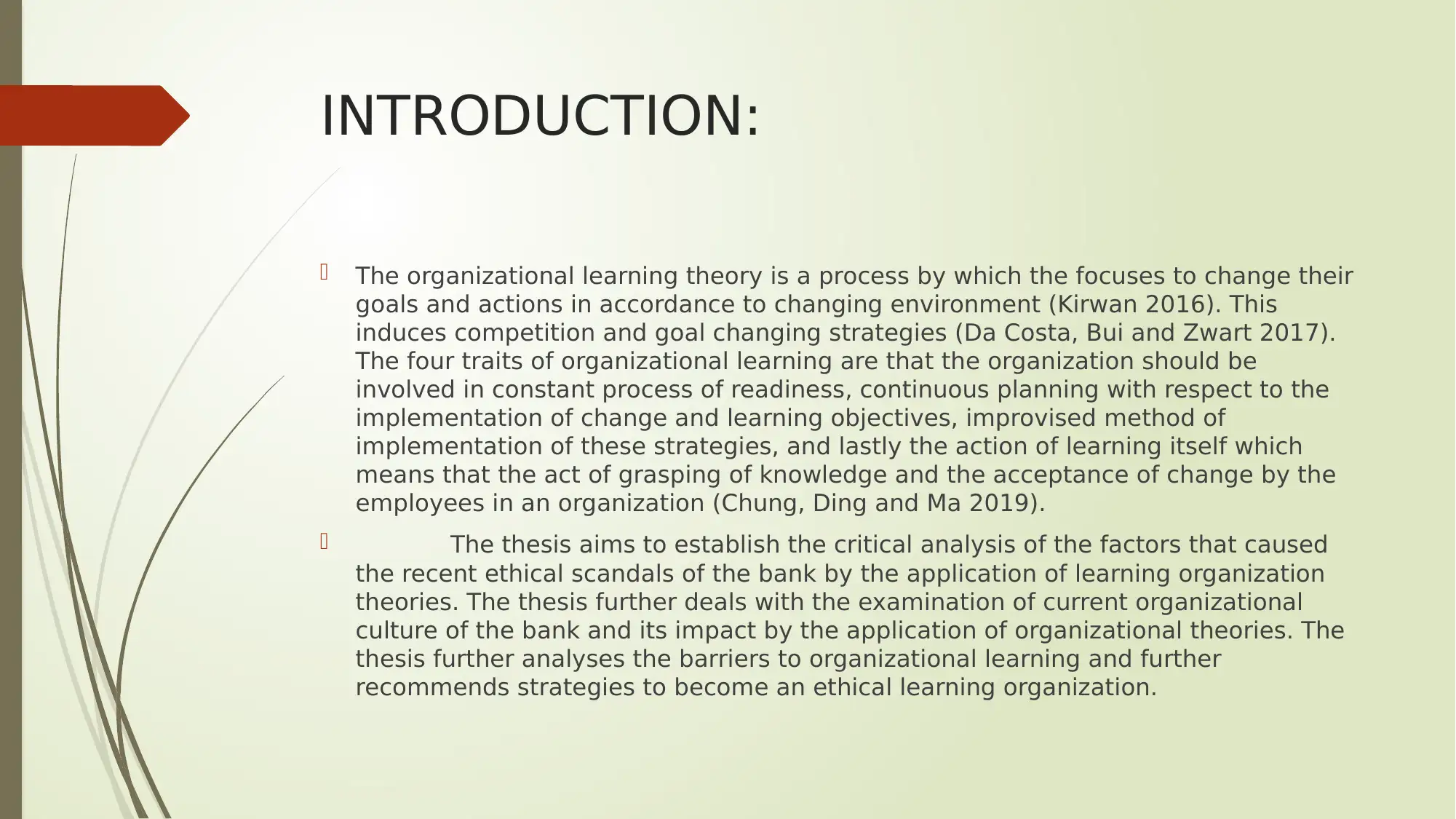
INTRODUCTION:
The organizational learning theory is a process by which the focuses to change their
goals and actions in accordance to changing environment (Kirwan 2016). This
induces competition and goal changing strategies (Da Costa, Bui and Zwart 2017).
The four traits of organizational learning are that the organization should be
involved in constant process of readiness, continuous planning with respect to the
implementation of change and learning objectives, improvised method of
implementation of these strategies, and lastly the action of learning itself which
means that the act of grasping of knowledge and the acceptance of change by the
employees in an organization (Chung, Ding and Ma 2019).
The thesis aims to establish the critical analysis of the factors that caused
the recent ethical scandals of the bank by the application of learning organization
theories. The thesis further deals with the examination of current organizational
culture of the bank and its impact by the application of organizational theories. The
thesis further analyses the barriers to organizational learning and further
recommends strategies to become an ethical learning organization.
The organizational learning theory is a process by which the focuses to change their
goals and actions in accordance to changing environment (Kirwan 2016). This
induces competition and goal changing strategies (Da Costa, Bui and Zwart 2017).
The four traits of organizational learning are that the organization should be
involved in constant process of readiness, continuous planning with respect to the
implementation of change and learning objectives, improvised method of
implementation of these strategies, and lastly the action of learning itself which
means that the act of grasping of knowledge and the acceptance of change by the
employees in an organization (Chung, Ding and Ma 2019).
The thesis aims to establish the critical analysis of the factors that caused
the recent ethical scandals of the bank by the application of learning organization
theories. The thesis further deals with the examination of current organizational
culture of the bank and its impact by the application of organizational theories. The
thesis further analyses the barriers to organizational learning and further
recommends strategies to become an ethical learning organization.
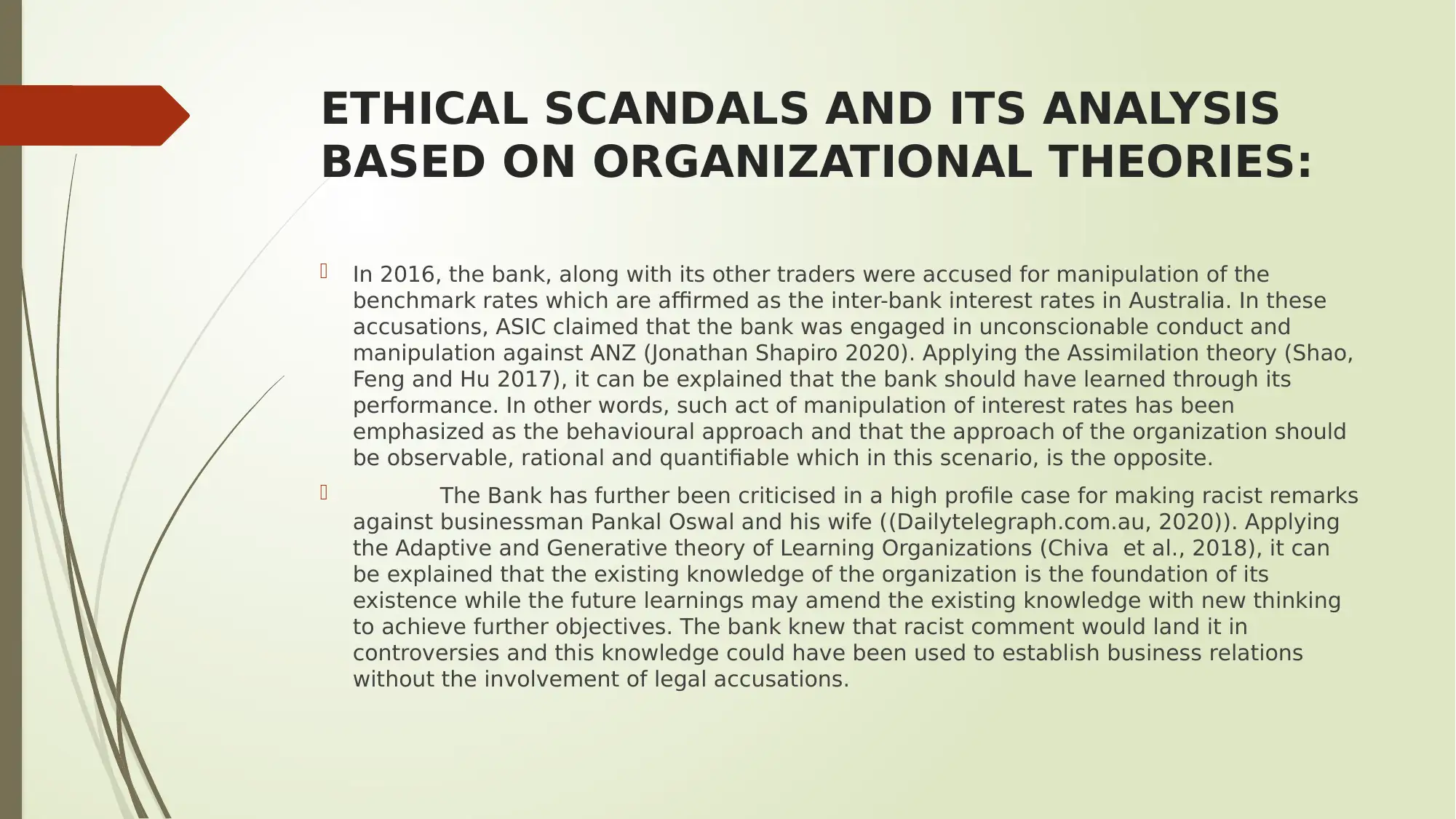
ETHICAL SCANDALS AND ITS ANALYSIS
BASED ON ORGANIZATIONAL THEORIES:
In 2016, the bank, along with its other traders were accused for manipulation of the
benchmark rates which are affirmed as the inter-bank interest rates in Australia. In these
accusations, ASIC claimed that the bank was engaged in unconscionable conduct and
manipulation against ANZ (Jonathan Shapiro 2020). Applying the Assimilation theory (Shao,
Feng and Hu 2017), it can be explained that the bank should have learned through its
performance. In other words, such act of manipulation of interest rates has been
emphasized as the behavioural approach and that the approach of the organization should
be observable, rational and quantifiable which in this scenario, is the opposite.
The Bank has further been criticised in a high profile case for making racist remarks
against businessman Pankal Oswal and his wife ((Dailytelegraph.com.au, 2020)). Applying
the Adaptive and Generative theory of Learning Organizations (Chiva et al., 2018), it can
be explained that the existing knowledge of the organization is the foundation of its
existence while the future learnings may amend the existing knowledge with new thinking
to achieve further objectives. The bank knew that racist comment would land it in
controversies and this knowledge could have been used to establish business relations
without the involvement of legal accusations.
BASED ON ORGANIZATIONAL THEORIES:
In 2016, the bank, along with its other traders were accused for manipulation of the
benchmark rates which are affirmed as the inter-bank interest rates in Australia. In these
accusations, ASIC claimed that the bank was engaged in unconscionable conduct and
manipulation against ANZ (Jonathan Shapiro 2020). Applying the Assimilation theory (Shao,
Feng and Hu 2017), it can be explained that the bank should have learned through its
performance. In other words, such act of manipulation of interest rates has been
emphasized as the behavioural approach and that the approach of the organization should
be observable, rational and quantifiable which in this scenario, is the opposite.
The Bank has further been criticised in a high profile case for making racist remarks
against businessman Pankal Oswal and his wife ((Dailytelegraph.com.au, 2020)). Applying
the Adaptive and Generative theory of Learning Organizations (Chiva et al., 2018), it can
be explained that the existing knowledge of the organization is the foundation of its
existence while the future learnings may amend the existing knowledge with new thinking
to achieve further objectives. The bank knew that racist comment would land it in
controversies and this knowledge could have been used to establish business relations
without the involvement of legal accusations.
⊘ This is a preview!⊘
Do you want full access?
Subscribe today to unlock all pages.

Trusted by 1+ million students worldwide
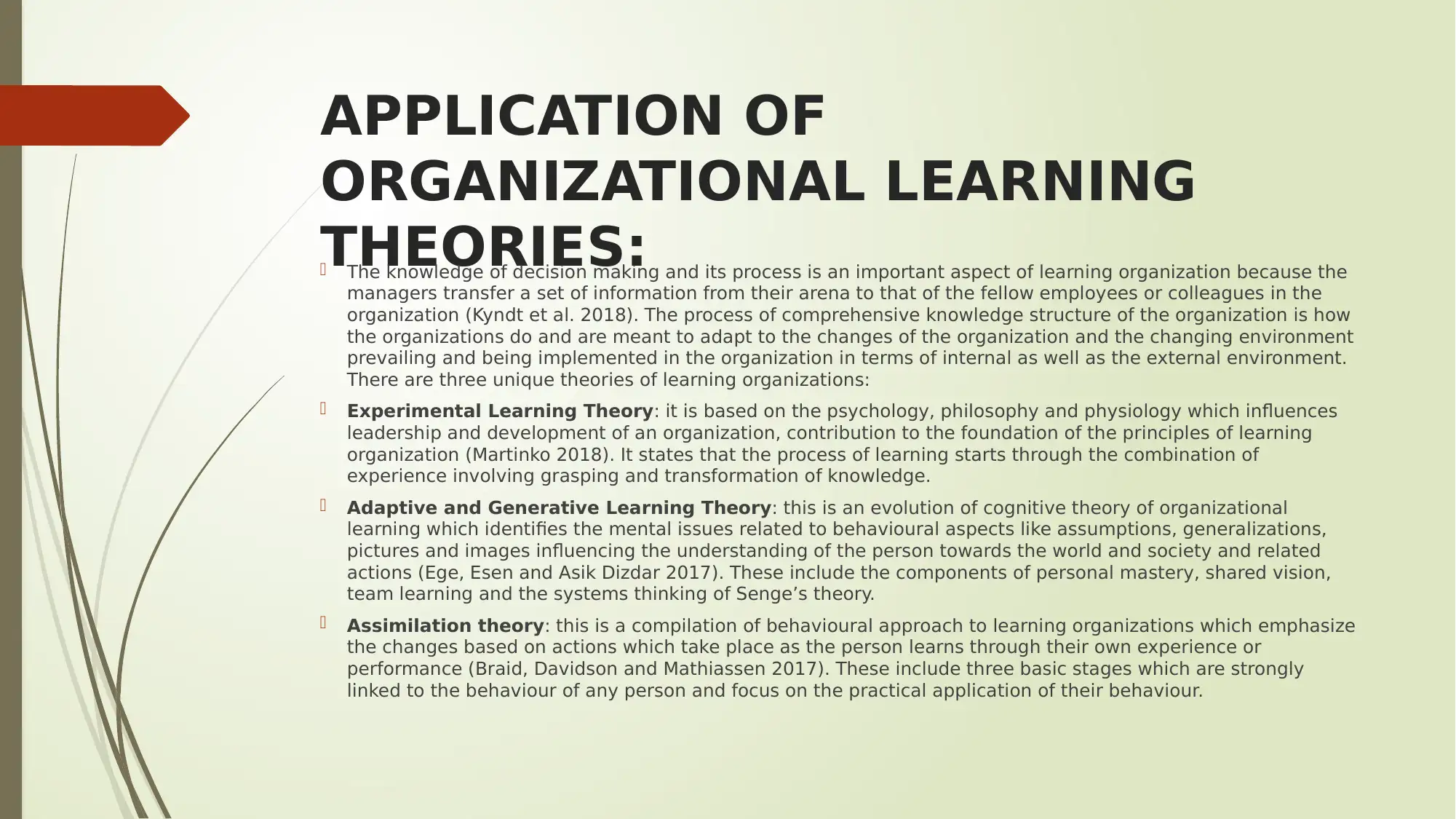
APPLICATION OF
ORGANIZATIONAL LEARNING
THEORIES: The knowledge of decision making and its process is an important aspect of learning organization because the
managers transfer a set of information from their arena to that of the fellow employees or colleagues in the
organization (Kyndt et al. 2018). The process of comprehensive knowledge structure of the organization is how
the organizations do and are meant to adapt to the changes of the organization and the changing environment
prevailing and being implemented in the organization in terms of internal as well as the external environment.
There are three unique theories of learning organizations:
Experimental Learning Theory: it is based on the psychology, philosophy and physiology which influences
leadership and development of an organization, contribution to the foundation of the principles of learning
organization (Martinko 2018). It states that the process of learning starts through the combination of
experience involving grasping and transformation of knowledge.
Adaptive and Generative Learning Theory: this is an evolution of cognitive theory of organizational
learning which identifies the mental issues related to behavioural aspects like assumptions, generalizations,
pictures and images influencing the understanding of the person towards the world and society and related
actions (Ege, Esen and Asik Dizdar 2017). These include the components of personal mastery, shared vision,
team learning and the systems thinking of Senge’s theory.
Assimilation theory: this is a compilation of behavioural approach to learning organizations which emphasize
the changes based on actions which take place as the person learns through their own experience or
performance (Braid, Davidson and Mathiassen 2017). These include three basic stages which are strongly
linked to the behaviour of any person and focus on the practical application of their behaviour.
ORGANIZATIONAL LEARNING
THEORIES: The knowledge of decision making and its process is an important aspect of learning organization because the
managers transfer a set of information from their arena to that of the fellow employees or colleagues in the
organization (Kyndt et al. 2018). The process of comprehensive knowledge structure of the organization is how
the organizations do and are meant to adapt to the changes of the organization and the changing environment
prevailing and being implemented in the organization in terms of internal as well as the external environment.
There are three unique theories of learning organizations:
Experimental Learning Theory: it is based on the psychology, philosophy and physiology which influences
leadership and development of an organization, contribution to the foundation of the principles of learning
organization (Martinko 2018). It states that the process of learning starts through the combination of
experience involving grasping and transformation of knowledge.
Adaptive and Generative Learning Theory: this is an evolution of cognitive theory of organizational
learning which identifies the mental issues related to behavioural aspects like assumptions, generalizations,
pictures and images influencing the understanding of the person towards the world and society and related
actions (Ege, Esen and Asik Dizdar 2017). These include the components of personal mastery, shared vision,
team learning and the systems thinking of Senge’s theory.
Assimilation theory: this is a compilation of behavioural approach to learning organizations which emphasize
the changes based on actions which take place as the person learns through their own experience or
performance (Braid, Davidson and Mathiassen 2017). These include three basic stages which are strongly
linked to the behaviour of any person and focus on the practical application of their behaviour.
Paraphrase This Document
Need a fresh take? Get an instant paraphrase of this document with our AI Paraphraser
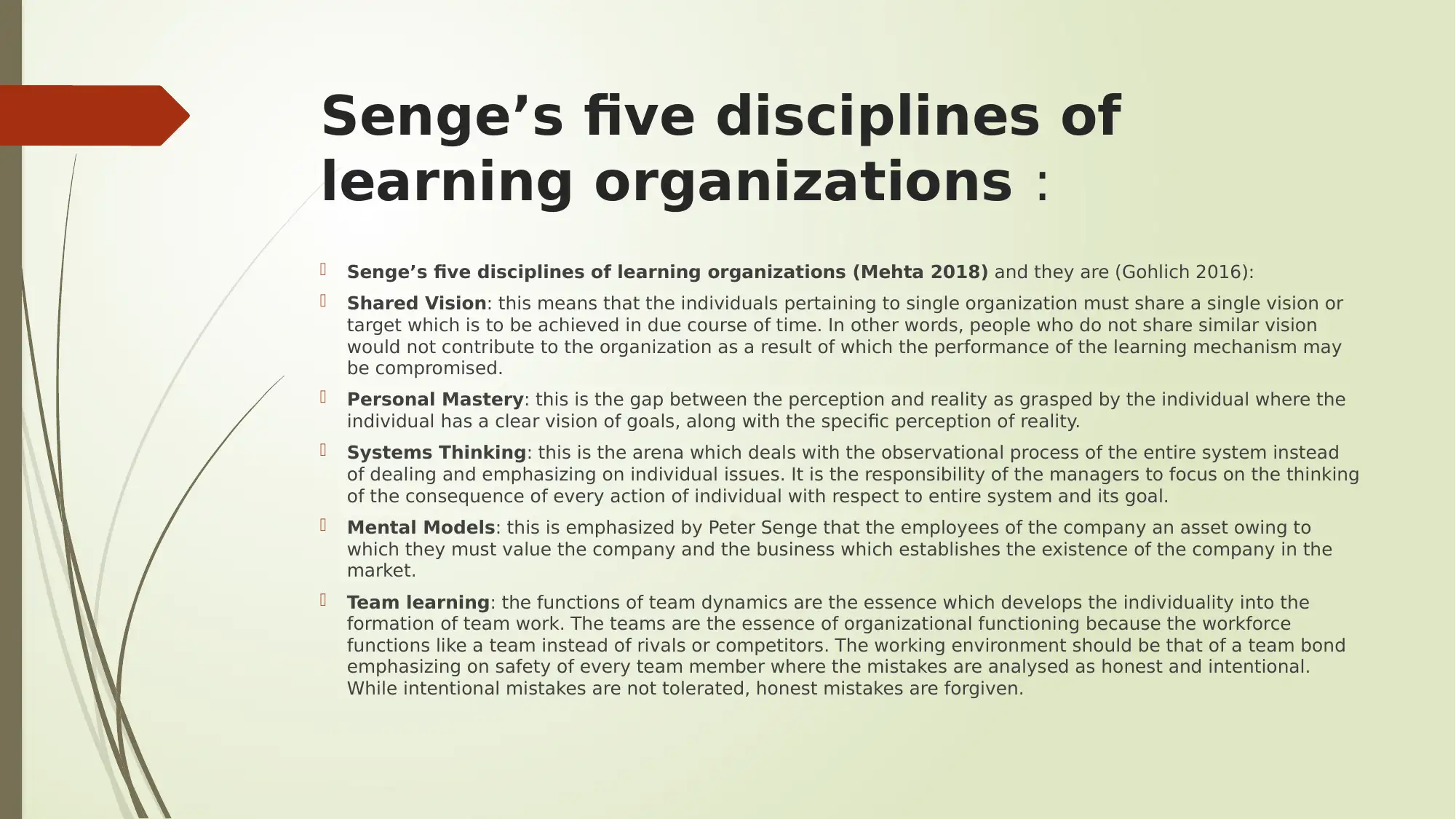
Senge’s five disciplines of
learning organizations :
Senge’s five disciplines of learning organizations (Mehta 2018) and they are (Gohlich 2016):
Shared Vision: this means that the individuals pertaining to single organization must share a single vision or
target which is to be achieved in due course of time. In other words, people who do not share similar vision
would not contribute to the organization as a result of which the performance of the learning mechanism may
be compromised.
Personal Mastery: this is the gap between the perception and reality as grasped by the individual where the
individual has a clear vision of goals, along with the specific perception of reality.
Systems Thinking: this is the arena which deals with the observational process of the entire system instead
of dealing and emphasizing on individual issues. It is the responsibility of the managers to focus on the thinking
of the consequence of every action of individual with respect to entire system and its goal.
Mental Models: this is emphasized by Peter Senge that the employees of the company an asset owing to
which they must value the company and the business which establishes the existence of the company in the
market.
Team learning: the functions of team dynamics are the essence which develops the individuality into the
formation of team work. The teams are the essence of organizational functioning because the workforce
functions like a team instead of rivals or competitors. The working environment should be that of a team bond
emphasizing on safety of every team member where the mistakes are analysed as honest and intentional.
While intentional mistakes are not tolerated, honest mistakes are forgiven.
learning organizations :
Senge’s five disciplines of learning organizations (Mehta 2018) and they are (Gohlich 2016):
Shared Vision: this means that the individuals pertaining to single organization must share a single vision or
target which is to be achieved in due course of time. In other words, people who do not share similar vision
would not contribute to the organization as a result of which the performance of the learning mechanism may
be compromised.
Personal Mastery: this is the gap between the perception and reality as grasped by the individual where the
individual has a clear vision of goals, along with the specific perception of reality.
Systems Thinking: this is the arena which deals with the observational process of the entire system instead
of dealing and emphasizing on individual issues. It is the responsibility of the managers to focus on the thinking
of the consequence of every action of individual with respect to entire system and its goal.
Mental Models: this is emphasized by Peter Senge that the employees of the company an asset owing to
which they must value the company and the business which establishes the existence of the company in the
market.
Team learning: the functions of team dynamics are the essence which develops the individuality into the
formation of team work. The teams are the essence of organizational functioning because the workforce
functions like a team instead of rivals or competitors. The working environment should be that of a team bond
emphasizing on safety of every team member where the mistakes are analysed as honest and intentional.
While intentional mistakes are not tolerated, honest mistakes are forgiven.
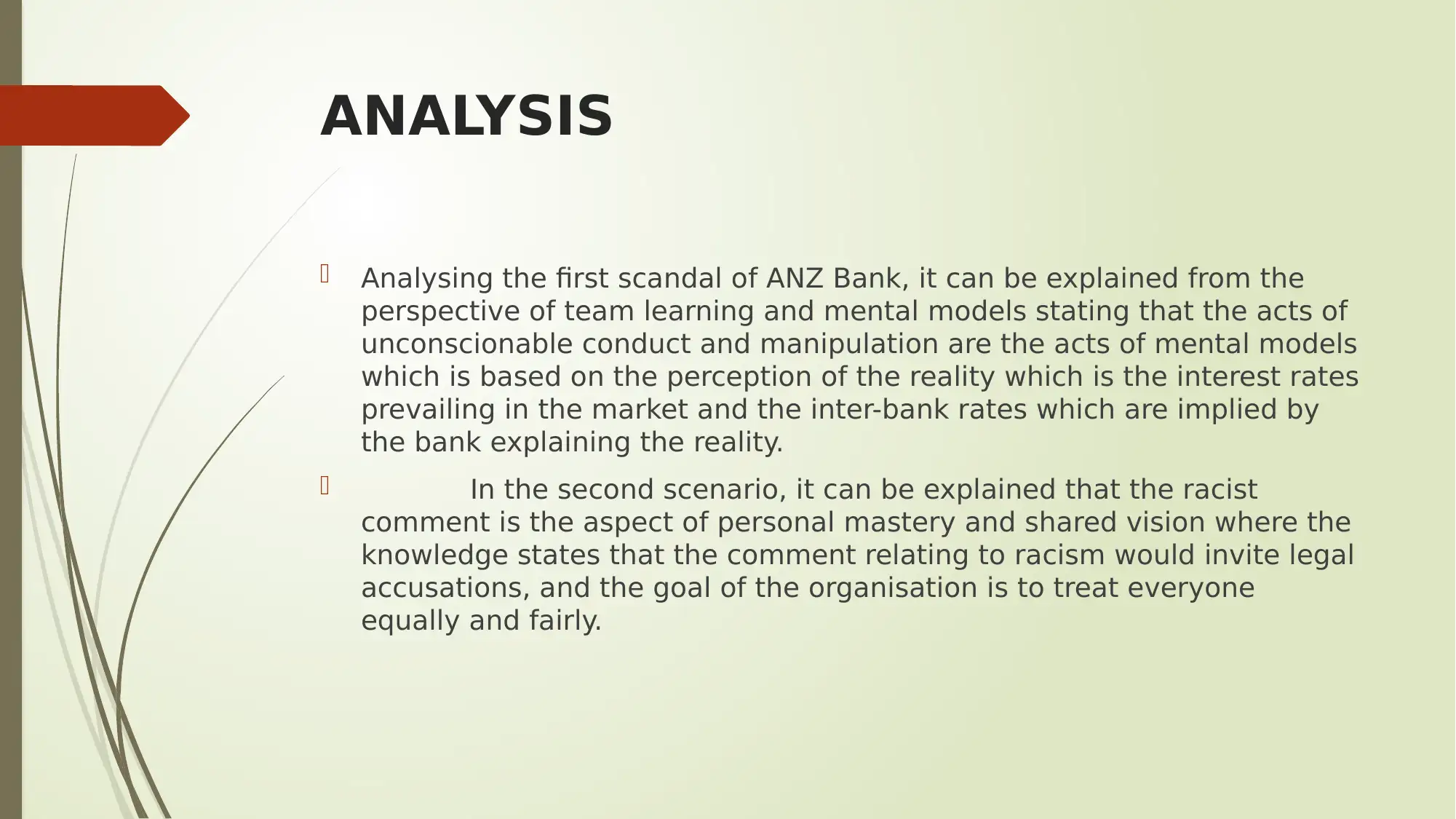
ANALYSIS
Analysing the first scandal of ANZ Bank, it can be explained from the
perspective of team learning and mental models stating that the acts of
unconscionable conduct and manipulation are the acts of mental models
which is based on the perception of the reality which is the interest rates
prevailing in the market and the inter-bank rates which are implied by
the bank explaining the reality.
In the second scenario, it can be explained that the racist
comment is the aspect of personal mastery and shared vision where the
knowledge states that the comment relating to racism would invite legal
accusations, and the goal of the organisation is to treat everyone
equally and fairly.
Analysing the first scandal of ANZ Bank, it can be explained from the
perspective of team learning and mental models stating that the acts of
unconscionable conduct and manipulation are the acts of mental models
which is based on the perception of the reality which is the interest rates
prevailing in the market and the inter-bank rates which are implied by
the bank explaining the reality.
In the second scenario, it can be explained that the racist
comment is the aspect of personal mastery and shared vision where the
knowledge states that the comment relating to racism would invite legal
accusations, and the goal of the organisation is to treat everyone
equally and fairly.
⊘ This is a preview!⊘
Do you want full access?
Subscribe today to unlock all pages.

Trusted by 1+ million students worldwide
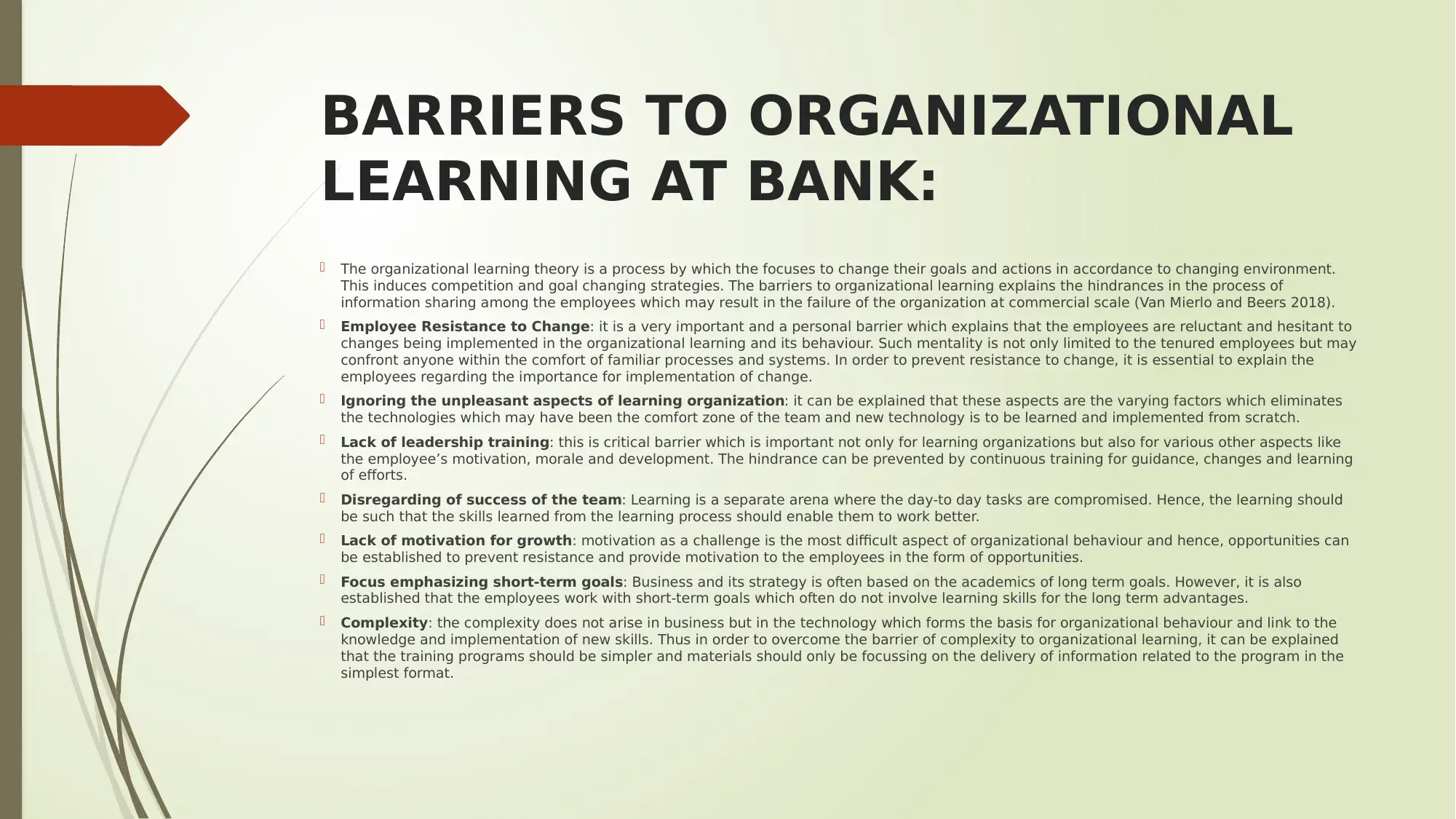
BARRIERS TO ORGANIZATIONAL
LEARNING AT BANK:
The organizational learning theory is a process by which the focuses to change their goals and actions in accordance to changing environment.
This induces competition and goal changing strategies. The barriers to organizational learning explains the hindrances in the process of
information sharing among the employees which may result in the failure of the organization at commercial scale (Van Mierlo and Beers 2018).
Employee Resistance to Change: it is a very important and a personal barrier which explains that the employees are reluctant and hesitant to
changes being implemented in the organizational learning and its behaviour. Such mentality is not only limited to the tenured employees but may
confront anyone within the comfort of familiar processes and systems. In order to prevent resistance to change, it is essential to explain the
employees regarding the importance for implementation of change.
Ignoring the unpleasant aspects of learning organization: it can be explained that these aspects are the varying factors which eliminates
the technologies which may have been the comfort zone of the team and new technology is to be learned and implemented from scratch.
Lack of leadership training: this is critical barrier which is important not only for learning organizations but also for various other aspects like
the employee’s motivation, morale and development. The hindrance can be prevented by continuous training for guidance, changes and learning
of efforts.
Disregarding of success of the team: Learning is a separate arena where the day-to day tasks are compromised. Hence, the learning should
be such that the skills learned from the learning process should enable them to work better.
Lack of motivation for growth: motivation as a challenge is the most difficult aspect of organizational behaviour and hence, opportunities can
be established to prevent resistance and provide motivation to the employees in the form of opportunities.
Focus emphasizing short-term goals: Business and its strategy is often based on the academics of long term goals. However, it is also
established that the employees work with short-term goals which often do not involve learning skills for the long term advantages.
Complexity: the complexity does not arise in business but in the technology which forms the basis for organizational behaviour and link to the
knowledge and implementation of new skills. Thus in order to overcome the barrier of complexity to organizational learning, it can be explained
that the training programs should be simpler and materials should only be focussing on the delivery of information related to the program in the
simplest format.
LEARNING AT BANK:
The organizational learning theory is a process by which the focuses to change their goals and actions in accordance to changing environment.
This induces competition and goal changing strategies. The barriers to organizational learning explains the hindrances in the process of
information sharing among the employees which may result in the failure of the organization at commercial scale (Van Mierlo and Beers 2018).
Employee Resistance to Change: it is a very important and a personal barrier which explains that the employees are reluctant and hesitant to
changes being implemented in the organizational learning and its behaviour. Such mentality is not only limited to the tenured employees but may
confront anyone within the comfort of familiar processes and systems. In order to prevent resistance to change, it is essential to explain the
employees regarding the importance for implementation of change.
Ignoring the unpleasant aspects of learning organization: it can be explained that these aspects are the varying factors which eliminates
the technologies which may have been the comfort zone of the team and new technology is to be learned and implemented from scratch.
Lack of leadership training: this is critical barrier which is important not only for learning organizations but also for various other aspects like
the employee’s motivation, morale and development. The hindrance can be prevented by continuous training for guidance, changes and learning
of efforts.
Disregarding of success of the team: Learning is a separate arena where the day-to day tasks are compromised. Hence, the learning should
be such that the skills learned from the learning process should enable them to work better.
Lack of motivation for growth: motivation as a challenge is the most difficult aspect of organizational behaviour and hence, opportunities can
be established to prevent resistance and provide motivation to the employees in the form of opportunities.
Focus emphasizing short-term goals: Business and its strategy is often based on the academics of long term goals. However, it is also
established that the employees work with short-term goals which often do not involve learning skills for the long term advantages.
Complexity: the complexity does not arise in business but in the technology which forms the basis for organizational behaviour and link to the
knowledge and implementation of new skills. Thus in order to overcome the barrier of complexity to organizational learning, it can be explained
that the training programs should be simpler and materials should only be focussing on the delivery of information related to the program in the
simplest format.
Paraphrase This Document
Need a fresh take? Get an instant paraphrase of this document with our AI Paraphraser
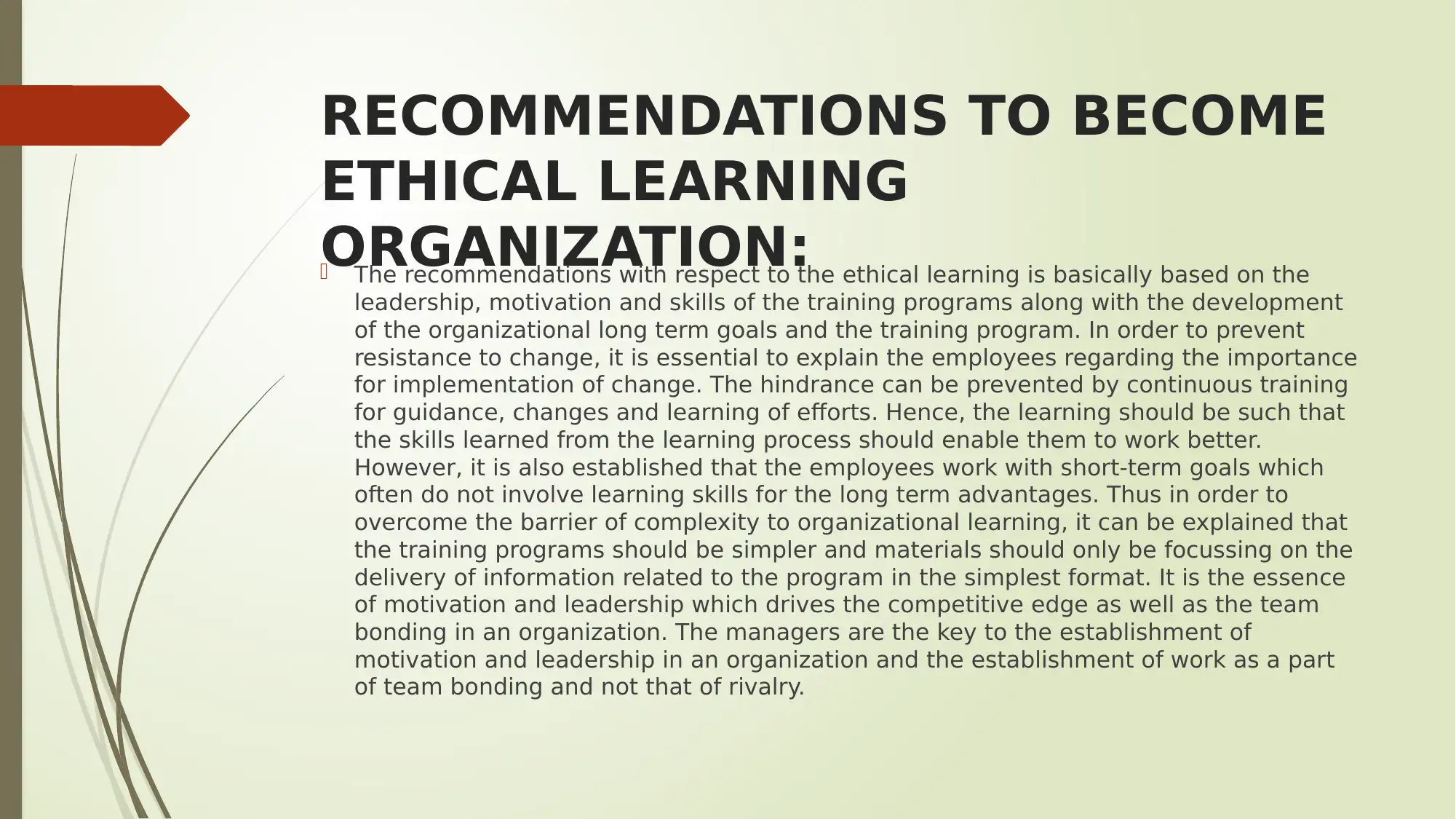
RECOMMENDATIONS TO BECOME
ETHICAL LEARNING
ORGANIZATION: The recommendations with respect to the ethical learning is basically based on the
leadership, motivation and skills of the training programs along with the development
of the organizational long term goals and the training program. In order to prevent
resistance to change, it is essential to explain the employees regarding the importance
for implementation of change. The hindrance can be prevented by continuous training
for guidance, changes and learning of efforts. Hence, the learning should be such that
the skills learned from the learning process should enable them to work better.
However, it is also established that the employees work with short-term goals which
often do not involve learning skills for the long term advantages. Thus in order to
overcome the barrier of complexity to organizational learning, it can be explained that
the training programs should be simpler and materials should only be focussing on the
delivery of information related to the program in the simplest format. It is the essence
of motivation and leadership which drives the competitive edge as well as the team
bonding in an organization. The managers are the key to the establishment of
motivation and leadership in an organization and the establishment of work as a part
of team bonding and not that of rivalry.
ETHICAL LEARNING
ORGANIZATION: The recommendations with respect to the ethical learning is basically based on the
leadership, motivation and skills of the training programs along with the development
of the organizational long term goals and the training program. In order to prevent
resistance to change, it is essential to explain the employees regarding the importance
for implementation of change. The hindrance can be prevented by continuous training
for guidance, changes and learning of efforts. Hence, the learning should be such that
the skills learned from the learning process should enable them to work better.
However, it is also established that the employees work with short-term goals which
often do not involve learning skills for the long term advantages. Thus in order to
overcome the barrier of complexity to organizational learning, it can be explained that
the training programs should be simpler and materials should only be focussing on the
delivery of information related to the program in the simplest format. It is the essence
of motivation and leadership which drives the competitive edge as well as the team
bonding in an organization. The managers are the key to the establishment of
motivation and leadership in an organization and the establishment of work as a part
of team bonding and not that of rivalry.
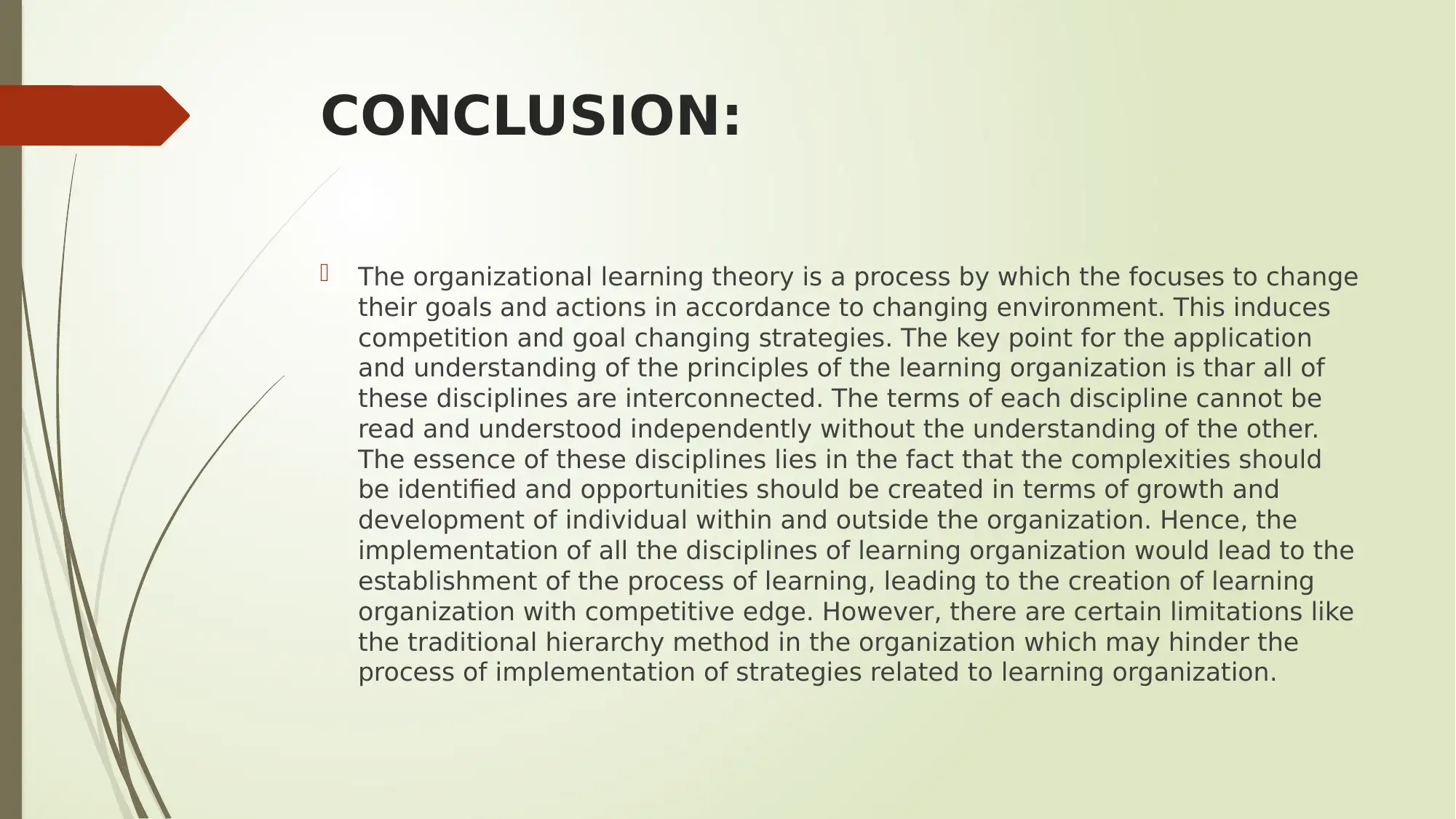
CONCLUSION:
The organizational learning theory is a process by which the focuses to change
their goals and actions in accordance to changing environment. This induces
competition and goal changing strategies. The key point for the application
and understanding of the principles of the learning organization is thar all of
these disciplines are interconnected. The terms of each discipline cannot be
read and understood independently without the understanding of the other.
The essence of these disciplines lies in the fact that the complexities should
be identified and opportunities should be created in terms of growth and
development of individual within and outside the organization. Hence, the
implementation of all the disciplines of learning organization would lead to the
establishment of the process of learning, leading to the creation of learning
organization with competitive edge. However, there are certain limitations like
the traditional hierarchy method in the organization which may hinder the
process of implementation of strategies related to learning organization.
The organizational learning theory is a process by which the focuses to change
their goals and actions in accordance to changing environment. This induces
competition and goal changing strategies. The key point for the application
and understanding of the principles of the learning organization is thar all of
these disciplines are interconnected. The terms of each discipline cannot be
read and understood independently without the understanding of the other.
The essence of these disciplines lies in the fact that the complexities should
be identified and opportunities should be created in terms of growth and
development of individual within and outside the organization. Hence, the
implementation of all the disciplines of learning organization would lead to the
establishment of the process of learning, leading to the creation of learning
organization with competitive edge. However, there are certain limitations like
the traditional hierarchy method in the organization which may hinder the
process of implementation of strategies related to learning organization.
⊘ This is a preview!⊘
Do you want full access?
Subscribe today to unlock all pages.

Trusted by 1+ million students worldwide
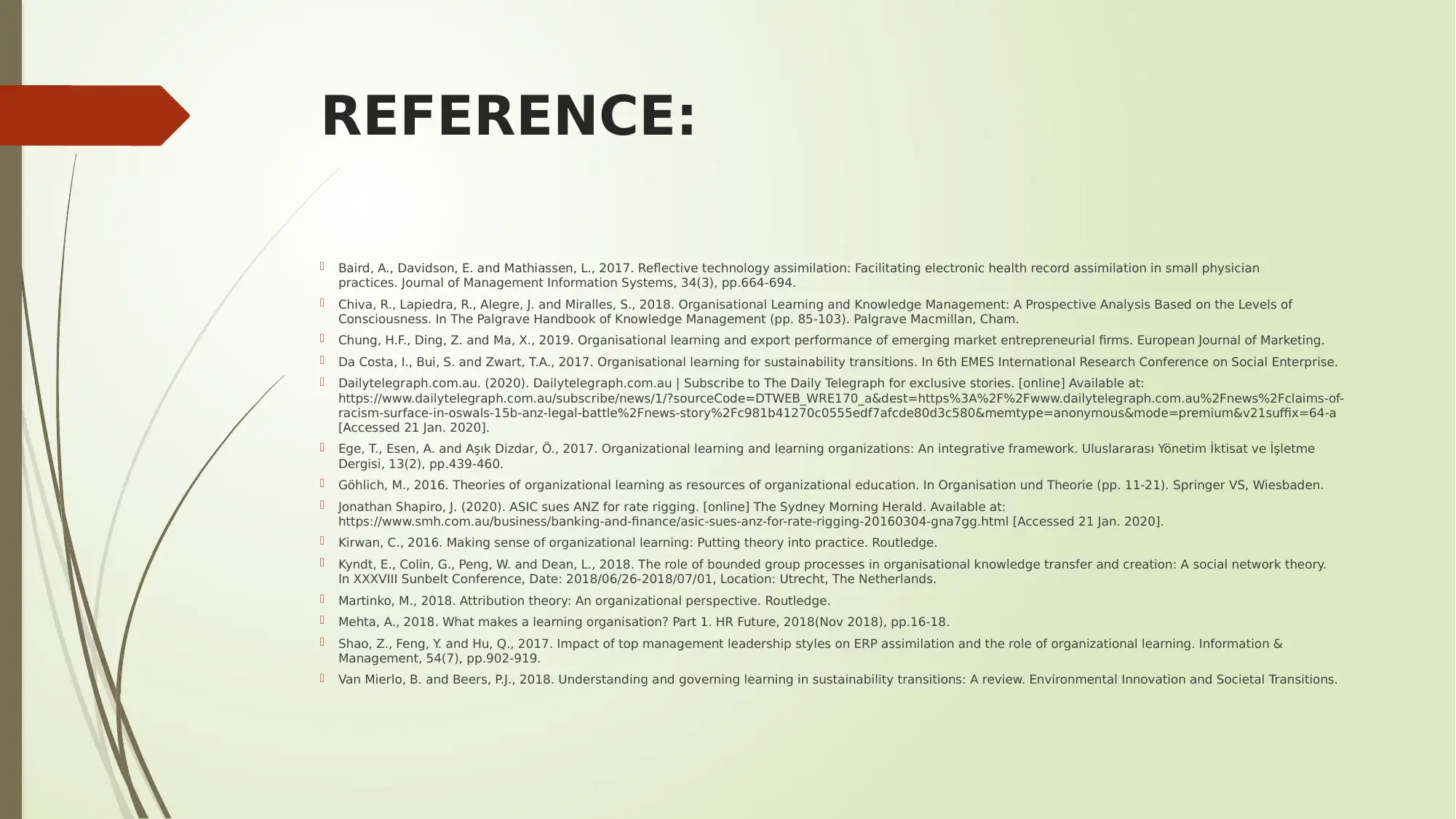
REFERENCE:
Baird, A., Davidson, E. and Mathiassen, L., 2017. Reflective technology assimilation: Facilitating electronic health record assimilation in small physician
practices. Journal of Management Information Systems, 34(3), pp.664-694.
Chiva, R., Lapiedra, R., Alegre, J. and Miralles, S., 2018. Organisational Learning and Knowledge Management: A Prospective Analysis Based on the Levels of
Consciousness. In The Palgrave Handbook of Knowledge Management (pp. 85-103). Palgrave Macmillan, Cham.
Chung, H.F., Ding, Z. and Ma, X., 2019. Organisational learning and export performance of emerging market entrepreneurial firms. European Journal of Marketing.
Da Costa, I., Bui, S. and Zwart, T.A., 2017. Organisational learning for sustainability transitions. In 6th EMES International Research Conference on Social Enterprise.
Dailytelegraph.com.au. (2020). Dailytelegraph.com.au | Subscribe to The Daily Telegraph for exclusive stories. [online] Available at:
https://www.dailytelegraph.com.au/subscribe/news/1/?sourceCode=DTWEB_WRE170_a&dest=https%3A%2F%2Fwww.dailytelegraph.com.au%2Fnews%2Fclaims-of-
racism-surface-in-oswals-15b-anz-legal-battle%2Fnews-story%2Fc981b41270c0555edf7afcde80d3c580&memtype=anonymous&mode=premium&v21suffix=64-a
[Accessed 21 Jan. 2020].
Ege, T., Esen, A. and Aşık Dizdar, Ö., 2017. Organizational learning and learning organizations: An integrative framework. Uluslararası Yönetim İktisat ve İşletme
Dergisi, 13(2), pp.439-460.
Göhlich, M., 2016. Theories of organizational learning as resources of organizational education. In Organisation und Theorie (pp. 11-21). Springer VS, Wiesbaden.
Jonathan Shapiro, J. (2020). ASIC sues ANZ for rate rigging. [online] The Sydney Morning Herald. Available at:
https://www.smh.com.au/business/banking-and-finance/asic-sues-anz-for-rate-rigging-20160304-gna7gg.html [Accessed 21 Jan. 2020].
Kirwan, C., 2016. Making sense of organizational learning: Putting theory into practice. Routledge.
Kyndt, E., Colin, G., Peng, W. and Dean, L., 2018. The role of bounded group processes in organisational knowledge transfer and creation: A social network theory.
In XXXVIII Sunbelt Conference, Date: 2018/06/26-2018/07/01, Location: Utrecht, The Netherlands.
Martinko, M., 2018. Attribution theory: An organizational perspective. Routledge.
Mehta, A., 2018. What makes a learning organisation? Part 1. HR Future, 2018(Nov 2018), pp.16-18.
Shao, Z., Feng, Y. and Hu, Q., 2017. Impact of top management leadership styles on ERP assimilation and the role of organizational learning. Information &
Management, 54(7), pp.902-919.
Van Mierlo, B. and Beers, P.J., 2018. Understanding and governing learning in sustainability transitions: A review. Environmental Innovation and Societal Transitions.
Baird, A., Davidson, E. and Mathiassen, L., 2017. Reflective technology assimilation: Facilitating electronic health record assimilation in small physician
practices. Journal of Management Information Systems, 34(3), pp.664-694.
Chiva, R., Lapiedra, R., Alegre, J. and Miralles, S., 2018. Organisational Learning and Knowledge Management: A Prospective Analysis Based on the Levels of
Consciousness. In The Palgrave Handbook of Knowledge Management (pp. 85-103). Palgrave Macmillan, Cham.
Chung, H.F., Ding, Z. and Ma, X., 2019. Organisational learning and export performance of emerging market entrepreneurial firms. European Journal of Marketing.
Da Costa, I., Bui, S. and Zwart, T.A., 2017. Organisational learning for sustainability transitions. In 6th EMES International Research Conference on Social Enterprise.
Dailytelegraph.com.au. (2020). Dailytelegraph.com.au | Subscribe to The Daily Telegraph for exclusive stories. [online] Available at:
https://www.dailytelegraph.com.au/subscribe/news/1/?sourceCode=DTWEB_WRE170_a&dest=https%3A%2F%2Fwww.dailytelegraph.com.au%2Fnews%2Fclaims-of-
racism-surface-in-oswals-15b-anz-legal-battle%2Fnews-story%2Fc981b41270c0555edf7afcde80d3c580&memtype=anonymous&mode=premium&v21suffix=64-a
[Accessed 21 Jan. 2020].
Ege, T., Esen, A. and Aşık Dizdar, Ö., 2017. Organizational learning and learning organizations: An integrative framework. Uluslararası Yönetim İktisat ve İşletme
Dergisi, 13(2), pp.439-460.
Göhlich, M., 2016. Theories of organizational learning as resources of organizational education. In Organisation und Theorie (pp. 11-21). Springer VS, Wiesbaden.
Jonathan Shapiro, J. (2020). ASIC sues ANZ for rate rigging. [online] The Sydney Morning Herald. Available at:
https://www.smh.com.au/business/banking-and-finance/asic-sues-anz-for-rate-rigging-20160304-gna7gg.html [Accessed 21 Jan. 2020].
Kirwan, C., 2016. Making sense of organizational learning: Putting theory into practice. Routledge.
Kyndt, E., Colin, G., Peng, W. and Dean, L., 2018. The role of bounded group processes in organisational knowledge transfer and creation: A social network theory.
In XXXVIII Sunbelt Conference, Date: 2018/06/26-2018/07/01, Location: Utrecht, The Netherlands.
Martinko, M., 2018. Attribution theory: An organizational perspective. Routledge.
Mehta, A., 2018. What makes a learning organisation? Part 1. HR Future, 2018(Nov 2018), pp.16-18.
Shao, Z., Feng, Y. and Hu, Q., 2017. Impact of top management leadership styles on ERP assimilation and the role of organizational learning. Information &
Management, 54(7), pp.902-919.
Van Mierlo, B. and Beers, P.J., 2018. Understanding and governing learning in sustainability transitions: A review. Environmental Innovation and Societal Transitions.
Paraphrase This Document
Need a fresh take? Get an instant paraphrase of this document with our AI Paraphraser

THANK YOU
1 out of 11
Related Documents
Your All-in-One AI-Powered Toolkit for Academic Success.
+13062052269
info@desklib.com
Available 24*7 on WhatsApp / Email
![[object Object]](/_next/static/media/star-bottom.7253800d.svg)
Unlock your academic potential
Copyright © 2020–2026 A2Z Services. All Rights Reserved. Developed and managed by ZUCOL.





